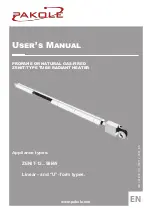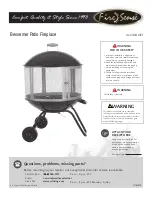
12
ventilation systems, clothes dryers and fireplaces shall also be
considered in determining the adequacy of a space to provide
combustion, ventilation and dilution air.
unusuallY tIGht constructIon
In unconfined spaces in buildings, infiltration may be adequate to
provide air for combustion, ventilation and dilution of flue gases.
However, in buildings of unusually tight construction (for example,
weather stripping, heavily insulated, caulked, vapor barrier, etc.)
additional air must be provided using the methods described in the
Confined Space section that follows.
confIned space
A Confined Space is one whose volume IS LESS THAN 50 cubic
feet per 1,000 Btu/hr (4.8 cm per kW) of the total input rating of all
appliances installed in the space.
Openings must be installed to provide fresh air for combustion,
ventilation and dilution in confined spaces. The required size for
the openings is dependent on the method used to provide fresh
air to the confined space AND the total Btu/hr input rating of all
appliances installed in the space.
dIrect vent applIances
Appliances installed in a Direct Vent configuration that derive all
air for combustion from the outdoor atmosphere through sealed
intake air piping are not factored in the total appliance input Btu/hr
calculations used to determine the size of openings providing fresh
air into confined spaces.
eXhaust fans
Where exhaust fans are installed, additional air shall be provided
to replace the exhausted air. When an exhaust fan is installed in
the same space with a water heater, sufficient openings to provide
fresh air must be provided that accommodate the requirements
for all appliances in the room and the exhaust fan. Undersized
openings will cause air to be drawn into the room through the water
heater’s vent system causing poor combustion. Sooting, serious
damage to the water heater and the risk of fire or explosion may
result. It can also create a risk of asphyxiation.
louvers and GrIlles
The free areas of the fresh air openings in the instructions that
follow do not take in to account the presence of louvers, grilles or
screens in the openings.
The required size of openings for combustion, ventilation and
dilution air shall be based on the “net free area” of each opening.
Where the free area through a design of louver or grille or screen is
known, it shall be used in calculating the size of opening required to
provide the free area specified. Where the louver and grille design
and free area are not known, it shall be assumed that wood louvers
will have 25% free area and metal louvers and grilles will have 75%
free area. Non motorized louvers and grilles shall be fixed in the
open position.
fresh aIr openInGs for confIned spaces
The following instructions shall be used to calculate the size, number
and placement of openings providing fresh air for combustion,
ventilation and dilution in confined spaces. The illustrations shown
in this section of the manual are a reference for the openings that
provide fresh air into confined spaces only.
do not
refer to these
illustrations for the purpose of vent installation. See venting Installation
on page 20 for complete venting installation instructions.
outdoor aIr throuGh two openInGs
fIGure 4.
The confined space shall be provided with two permanent
openings, one commencing within 12 inches (300 mm) of the top
and one commencing within 12 inches (300 mm) of the bottom of
the enclosure. The openings shall communicate directly with the
outdoors. See Figure 4.
Each opening shall have a minimum free area of 1 square inch per
4,000 Btu/hr (550 mm
2
per kW) of the aggregate input rating of all
appliances installed in the enclosure. Each opening shall not be
less than 100 square inches (645 cm
2
).
outdoor aIr throuGh one openInG
fIGure 5.
Alternatively a single permanent opening, commencing within 12
inches (300 mm) of the top of the enclosure, shall be provided.
See Figure 5. The water heater shall have clearances of at
least 1 inch (25 mm) from the sides and back and 6 inches (l50
mm) from the front of the appliance. The opening shall directly
communicate with the outdoors or shall communicate through a
vertical or horizontal duct to the outdoors or spaces that freely
communicate with the outdoors and shall have a minimum free
area of the following:
Summary of Contents for she100
Page 5: ...5 General safety information...
Page 56: ...56 Notes...
Page 57: ...57 Notes...
Page 58: ...58 Notes...













































